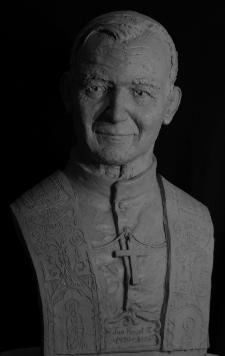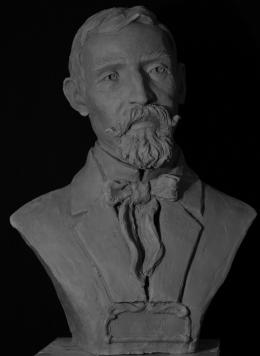Polish Heroes

|
JAN PAWEŁ II
"The Great" — Pastor to the World And Faithful Son of Poland
Though the world has benefited by the inspirational wisdom, holiness, and modesty that characterized his Christian service to others throughout his life, Poland also benefited from John Paul II's never-faltering support and defense of the God-given right of polskość to Poles and the God-given right of Poland to exist as a free and independent nation in its greater European home. On the occasion of his first visit to Poland as Pope, John Paul II spoke in Warsaw's Victory Square at the Tomb of Poland's Unknown Soldier:
"We stand here before the Tomb of the Unknown Soldier. In the history of Poland, ancient and modern, there is a special basis, a special reason, for this
Tomb. How many places are there in his native land where that soldier has fallen? How many places in Europe and around the world are there where by his death he has cried out that there cannot be a just Europe without Polish independence in concrete geographical form? How many battlefields are there on which that soldier has fallen for 'our freedom and yours' and thus borne witness to the rights of the person which are so closely interwoven with the inviolable rights of the people? Where are their graves, Poland? Where are they not? You known best, and God knows in Heaven."

|
JADWIGA ANDEGAWENSKA
Queen of Poland & Saint
Ten year old Jadwiga of Anjou was thrust from the comfort and security of childhood into the realm of adult politics and governance when she was crowned King of Poland (because the Poles had no precedence for a female ruler) and then three years later became the wife of the pagan Lithuanian
leader Jogaila who was twenty-three years her senior. In a rapid succession of events beyond her control, her childhood ended and she began her adult life's journey as king, then queen, wife, young woman, royal advisor, benefactress, and Christian icon for her subjects, with each step of the way revealing a highly intelligent, strong-willed but gentle person willingly accepting God's will and the duties she was expected to perform until her death at age 26. As Queen, she exercised a particularly moderating influence
on her much older husband who had converted to Christianity as a condition of being King of Poland. She offered herself up as a wholesome role model to the people of Lithuania, the last of Europe's pagan nations to convert to Christianity. Known for dedicating herself to good works, she donated her personal possessions to endow the Studium Generale of Kraków (Kraków Academy), created in 1374, so that in 1400, a year after her death, it was well on its way to becoming Jagiellonian University, the second-oldest in
eastern Europe. Jadwiga became a role model for the ages, not only in Poland
but elsewhere in Europe. Wawel Cathedral in Kraków is a site where she often prayed in her lifetime seeking God's guidance, and pilgrims visited her tomb, the site of miracles attributed to her. In 1997 at Queen Jadwiga's tomb John
Paul II canonized her as Saint Jadwiga.

|
MIKOLAJ KOPERNIK
Epitome of the Renaissance Man, Promulgator of a Modern
Theory of the Universe in use to this Day
For his time, Copernicus 70 year life span had been a singular achievement, one focused on the "many hats" that he had worn, some of which had been as advisor, astronomer, cleric, diplomat, economist, governor, jurist, mathematician, military commander, painter, scholar, physician, professor,
and translator. He was a testament to the European Renaissance of which he had been an important, integral part, indeed a true renaissance man. Of all his pursuits, he considered astronomy an avocation rather than a vocation, yet
it would be principally through his lifelong search into the nature of the universe that he would forever be acclaimed as one of greatest thinkers of the human experience. Copernicus' lifelong fascination with astronomy, however, put him in conflict with the teachings of the Church. The "geocentric" or earth-centered theory of the universe postulated by the Greek astronomer Ptolemy in the second century had been accepted by the Church as a spiritual truth. Based on his research, Copernicus developed a "heliocentric" or gas-centered theory which postulated that the unmovable sun was at the center with all the planets revolving around the sun in orbits, earth included, which also rotated on its axis every 24 hours while the moon
revolved around the earth. Copernicus fully realized the implications of his heliocentric theory as it related to the authority of his beloved Church and foundation of his Catholic Christian faith. Therefore, his monumental work of a lifetime, De Revolutionibus Orbium Coelestium was not to be published at his request until the day he died on May 24, 1543.

|
HENRYK SIENKIEWICZ
Modern Poland's Homer
Awarded the Nobel Prize in Literature for his lifetime achievements as a Polish journalist and as a historical novelist, most notably Quo Vadis, Sienkiewicz was described by George Brandes as "The writer of greatest narrative talent among the living authors of Poland…" Brandes goes on to relate the following incident: "Passing through the side wing of the great Kremlin palace at Moscow, which contains the armoury (Orusheinaya Palata), we see, in the lower storey, twenty-two marble busts of Polish
kings and distinguished Poles; in the storey above, in the large round hall, the Polish throne, and, nearby, the crown worn by the last king of Poland, Stanislaus Augustus; and finally, in the adjoining room… sixty Polish banners, captured from 1831 to 1863, with Polish inscriptions, torn by
bullets, and to the right of these, on the floor, a beautifully made closed casket. In this casket is deposited the Constitution of the 3rd of May 1791… To be fought against, to be persecuted, to be treated as a criminal, when you are in the right, may be borne; but to see yourself treated as dead, to see your memories, your pride, your banner, your charter exhibited to the scorn of another as his possessions, as trinkets in a grave… to see with your own eyes…yet to go on living and believing in it — Yes, Poland, thou art the great symbol. The symbol of pinioned freedom, whose neck is trodden upon, symbol of those who lack any outlook, yet hope against all probability, in spite of all." This stirring narrative rings true in the heart of many who
have seen their country oppressed. Out of this national consciousness, Sienkiewicz wrote With Fire and Sword, The Deluge, Fire in the Steppe, The Teutonic Knights, and On the Field of Glory, all of which helped Poles scattered throughout the world as well as in the still-partitioned lands of
what had been the Polish-Lithuanian Commonwealth, to recall and understand their national past and their polskość which three contiguous Empires had sought to suppress and eradicate forever. Upon receiving the Nobel Prize, Sienkiewicz remarked that receiving the award was a momentous event for Poland: "She was pronounced dead, yet here is a proof that she lives on. She was pronounced defeated — and here is proof that
she is victorious."

|
JAN III SOBIESKI
King of Poland & Savior of Christian Europe in the Rout & Defeat of Ottoman Forces During the Turkish Siege of Vienna, Austria in 1683
Hailed as the savior of Western Europe from Ottoman armies that ravaged and destroyed lands throughout Europe, Sobieski is credited for halting the westward expansion of the Ottoman armies led by "Black Mustafa." In a losing battle against the horde that had devastated Eastern Europe, Sobieski led allied Austrian and Polish cavalry in a brilliant and decisive flanking counterattack so comprehensive in victory that the Ottoman army withdrew to Hungary, never to threaten Western Europe again.
As I write, the Duke of Lorraine's ensign has hurried in with letters… They request assistance urgently, for the enemy occupies the same ravelin with them, and is digging tunnels beneath the bulwark… Our own sappers can feel it as they dig their countermines. He adds that the Vizir has pushed almost his entire army into the siege trenches in preparation for some major action… Tomorrow, God willing, we will expect to hear Vienna's guns, and the day after that to drink the Danube's waters… Our Lord and God, Blessed of all the Ages, has brought unheard of victory and glory to our nation. All the guns, the whole camp, has fallen into our hands… Having covered the trenches, the fields, and the camp with corpses, the enemy now flees in confusion… The Vizir took such hurried flight that he only had time to escape with one horse, and in the clothes he wore… They left behind them a mass of innocent local Austrian people, particularly women… bodies of dead women lie in great numbers… Today I was in the city, which could have held out five more days, no more. Eyes have never seen such as the mines have done there… The Emperor's palace is completely ruined by shot.
John III Sobieski
|
THE KF HEADQUARTERS 15 East 65th Street New York. NY 10065 tel. (212) 734 2130 |
WASHINGTON D.C. CENTER 2025 O Street NW Washington D.C. 20036 tel. (202) 785 2320 |
WARSAW OFFICE ul. Kopernika 11/8 00-359 Warsaw, Poland tel.+48 (22) 621 70 67 www.kfpoland.org
|
